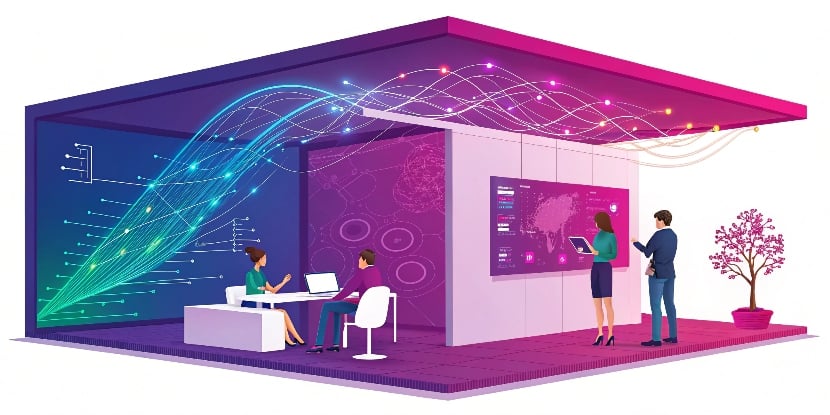How AI is Reshaping Software Development
The software development industry is evolving rapidly, with AI playing a central role in its transformation. No longer just a concept for the future, AI has become an essential tool that enhances how we design, build, and maintain software. By automating repetitive tasks and supporting complex architectural decisions, AI not only speeds up development but also improves code quality and drives innovation.
But what does this really mean for developers and businesses? In this article, we'll explore how AI is revolutionizing software development, its time-saving benefits, and how developers can best utilize that gained time to improve efficiency, scalability, and innovation.
How AI is Improving Software Development Efficiency
One of AI's most significant contributions to software development is efficiency. By automating repetitive and time-consuming tasks, AI enables developers to focus on high-value problem-solving and innovation. In my internal testing, I've observed development time improvements ranging from 3x to 5x, depending on the task. This acceleration not only speeds up project delivery but also allows for greater attention to software quality, architecture, and long-term maintainability.
1. AI-Powered Code Generation & Assistance
AI-powered tools like GitHub Copilot and Cursor generate code snippets, suggest improvements, and even create entire applications from high-level descriptions. Developers no longer have to write boilerplate code manually—AI handles that, reducing errors and increasing consistency.
2. AI for Bug Detection & Debugging
AI-driven debugging tools scan for vulnerabilities, inefficiencies, and errors, catching issues before they escalate. This significantly cuts down debugging time and ensures more reliable software.
3. AI-Driven Automated Testing
Traditional software testing is time-intensive. AI accelerates testing by automatically generating test cases, running them efficiently, and predicting potential failure points. This improves software reliability and reduces testing overhead.
AI-driven efficiency doesn't just make coding faster—it makes it smarter. But the real question is: how should developers utilize the time saved through AI integration?
Best Ways to Use Time Saved with AI in Software Development
AI is not replacing developers—it's enabling them to work smarter. The time saved by automating tasks should be reinvested into high-impact activities that drive better software architecture, scalability, and documentation.
1. Enhancing Software Architecture and System Design
With AI handling routine coding, developers can focus on improving software architecture and system scalability. Key areas to invest time in include:
- Creating detailed system architecture diagrams to ensure clarity and scalability.
- Exploring alternative design patterns for better software performance.
- Implementing best practices for microservices, APIs, and cloud-based applications.
Well-structured software architecture reduces technical debt and ensures long-term maintainability.
2. Optimizing Documentation & Workflow Efficiency
Comprehensive documentation improves team collaboration and software maintainability. Developers can use their AI-gained time to:
- Keep technical documentation up to date, making it easier for future development and onboarding.
- Improve internal documentation workflows, streamlining knowledge sharing across teams.
- Write clearer, more structured API documentation, ensuring seamless integration for third-party developers.
Good documentation isn't just a formality—it's a key driver of development efficiency.
3. Driving Innovation & Experimentation
With AI reducing coding overhead, developers can shift their focus to:
- Exploring new frameworks and programming languages to stay ahead of industry trends.
- Building rapid proof-of-concept prototypes to test new ideas without significant resource investment.
- Using AI-driven insights to improve user experience (UX) design, creating more intuitive applications.
By shifting time from repetitive coding to strategic experimentation, developers can push the boundaries of innovation.
The Balance Between AI and Human Oversight in Development
While AI enhances efficiency, human oversight remains crucial to ensure software quality and compliance. Key considerations include:
- Data Quality Dependence: AI's effectiveness is only as good as the data it's trained on. Poor data quality can lead to flawed outputs.
- Ethical and Legal Considerations: Developers must navigate intellectual property, security, and bias issues in AI-generated code.
- Human Intuition & Context: AI can suggest solutions, but only human developers can fully understand business context and user needs.
The most successful development teams will be those that strategically combine AI's automation capabilities with human expertise.
Conclusion: Leveraging AI as a Development Partner
AI has moved beyond theory and is now a driving force in software development. By automating routine tasks and aiding in critical decision-making, it enables developers to work more efficiently and concentrate on high-value, strategic efforts.
To maximize AI's potential, developers should use their saved time to enhance software architecture, optimize documentation, and drive innovation. The key to success lies in treating AI as a collaborator, not a replacement—leveraging its strengths while applying human intuition to create smarter, more scalable software solutions.
As AI continues to evolve, the future of software development belongs to those who embrace its capabilities while refining their own expertise. AI doesn't replace great developers—it makes them even better.
Ready to Transform Your Development Process?
Want to learn more about integrating AI into your development workflow? Explore our blog for deeper insights, or reach out to discuss how we can help optimize your software development process.
Related Articles

AI Integration Roadmap for Small Businesses
Discover the ultimate step-by-step AI integration roadmap for small businesses. Learn how to assess your needs, select the right tools, pilot projects, integrate AI into daily operations, and continuously optimize for growth and efficiency.

The Future of Consulting: How Independent Consultants Can Revolutionize Business in 2025
Explore how independent consultants can revolutionize business in 2025 through AI integration, digital transformation, and sustainable practices. Learn actionable strategies to thrive in the evolving consulting landscape.